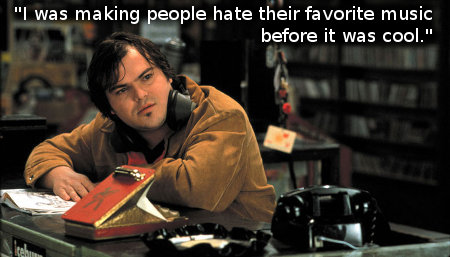Example of a Really Bad Promotional Piece

There's some snark going around on social media about this album review from the Current. I'm going to go on record as saying I think it's a great album, and anything that gets more people listening to it is also great. That's the album. The review itself, though, probably deserves a lot of that snark.
I'm going to brush past a few of the less obvious concerns coming up online, because dwelling on those would only amount to a bunch of shop talk that I don't want to write. What I'm interested in is the structure and content of the review and, more importantly, how it is and isn't the sort of thing one should write when trying to promote a product.
Some problems pop up right away in the opening lines:
"We're the Current. We've supported Jeremy Messersmith since he handed Mary Lucia a CD in a paper bag nearly 9 years ago. Of course we love his new album Heart Murmurs."
That doesn't make this review about the album:
It makes this review about how awesome we are for being the Current, and how much sooner we knew about this than you. And these things matter to you. So, by your own standards, we're better than you. Then, after deriving authority from exclusivity, the review finally gives the album a brief mention. Then it goes on to let you know that Rolling Stone and NPR Music love this new album, but makes sure to remind you that we were into it first.
I pasted the whole review into a text editor just get some word counts: The Current pats itself on the back for the first three paragraphs, or 201 words. The review almost gets through the next two paragraphs without humblebragging, (but still feels compelled to mention that we played this song first,) and spends 219 words giving honest opinions about a couple of album tracks. After that, it's one more paragraph (or 130 more words) about how this album's existence proves the Current's awesomeness.
So, the reviewer dedicates 60% of the article to talking about how great the Current is, (even a little more, as I didn't factor in the we played this song first part,) and then gives the album an obligatory mention because, you know, this was supposed to be a review of the album.
As an album review, this fails. As linkbait, it's only fairly competent. It comes off more like a love letter than anything else, but even as a love letter (by the Current, to the Current, in which the Current counts the many ways in which it finds itself unbelievably awesome,) it's still not much to look at.
Whatever they're selling, they're selling it to themselves and they're closing the sale by demeaning everyone who didn't have the good sense to agree with them nine years ago. It's the sort of thing that probably belongs on an internal company blog, but it's downright embarrassing as public blog posts go.
A better approach would have involved the sort of tack I'm using now, as I ramp up to help promote this secret science fiction project I'm working on:
First, you've got to be informative. You've got to disseminate information about the topic itself. You want to avoid using the topic as a vehicle for your own self-aggrandizing.
Second, you've got to be persuasive. You can talk about why you think your topic is so great. You can even do a little personal backstory to give yourself credibility, but you've got to go further. In the end, you've got to make an argument based on your topic's merits, not your own.
Third, write love letters to your fans, not yourself. You want to tell them what you admire about them, and how you think those admirable traits suggest that they're going to love what you're giving them. You do not want to give all the ink to a summary of your own refined tastes, then sit back and wait for the reader to adopt said tastes.
Do these three things and you've done something more than just make an argument for why you're right and why your readers should agree. You've given your readers the motivation to check it out for themselves. You've handed them a sincere pitch, and asked them to see if they agree.
And, if you've given decent consideration to your own opinion and presented your case in earnest, you can be pretty confident that plenty of others will give it the same critical consideration.
Then, if you happen to be endorsing something you genuinely believe is worthwhile (and you shouldn't be endorsing it if you don't) you can be pretty confident that plenty of your readers will see your point. You will have made the sale, as they say, or at least elicited enough critical consideration in others to keep the conversation going.